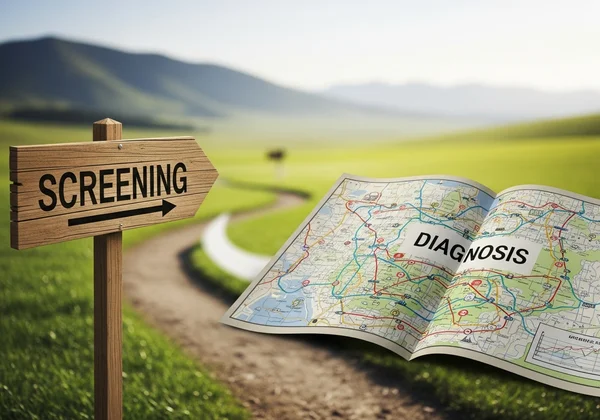Your Guide to an Affordable Bipolar Disorder Test & Accessible Diagnosis
November 11, 2025 | By Leo Vance
Feeling overwhelmed by intense mood swings and wondering if you might have bipolar disorder? You're likely also asking, how can I get a professional diagnosis without it costing a fortune? You are not alone in this search. Many people feel uncertain about their symptoms and are concerned about the financial and logistical barriers to seeking professional help. This guide is here to provide practical steps and resources to navigate the path toward an affordable and accessible bipolar disorder diagnosis. Taking the first step can feel daunting, but understanding your options is the key to empowerment on your mental health journey. An online Bipolar Disorder Test can be a valuable starting point, and our free online bipolar disorder test offers a discreet way to begin this journey.

Why a Professional Bipolar Diagnosis Matters
While self-screening tools are excellent for initial exploration, they are not a substitute for a comprehensive evaluation by a qualified healthcare professional. Why is a professional diagnosis so critical? It's the essential first step to getting the right support and treatment tailored to your unique situation, guiding you from uncertainty to clarity.
Screening vs. Diagnosis: Knowing the Difference
It’s crucial to understand the distinction between a screening tool and a clinical diagnosis. A screening, like the online bipolar disorder test offered on our platform, is designed to help you identify potential signs and patterns consistent with bipolar disorder. It's a confidential self-screening, an insightful first step that can organize your thoughts and concerns. A diagnosis, however, is a thorough medical assessment conducted by a psychiatrist or clinical psychologist. This process involves a detailed review of your medical history, symptoms, and life experiences to rule out other conditions and confirm a diagnosis. Think of a screening as a signpost pointing you in the right direction, while a diagnosis is the detailed map for your journey forward.

The Importance of Early & Accurate Identification
Receiving an early and accurate diagnosis for bipolar disorder can be life-changing. Left untreated, the condition can impact relationships, work, and overall well-being. An accurate diagnosis opens the door to effective treatment plans, which often include a combination of medication, therapy, and lifestyle strategies. This empowers you to manage your symptoms, reduce the frequency and intensity of mood episodes, and ultimately lead a stable, fulfilling life. Early identification helps prevent years of misunderstanding and misdiagnosis (such as being treated only for depression), ensuring you get targeted support that truly addresses the underlying condition.
Finding Affordable Bipolar Disorder Test & Diagnosis Options
The cost of a diagnostic evaluation is a significant barrier for many. The good news is that several avenues exist for affordable mental healthcare. You don't have to let financial constraints stop you from getting the clarity you need. Exploring these options can make professional care, from an initial Bipolar Disorder Test to a full diagnosis, much more accessible.
Navigating Insurance and Financial Aid Programs
If you have health insurance, your first step should be to understand your plan's mental health coverage. Contact your insurance provider directly to ask about in-network psychiatrists or psychologists, copayments for specialist visits, and any deductibles you need to meet. For those without adequate insurance, many government and non-profit programs offer financial assistance. Look into programs like Medicaid or search for local mental health grants and subsidies that can help offset the cost of an evaluation.
Exploring Sliding-Scale Clinics & Community Mental Health Centers
Community mental health centers are excellent resources for affordable care. These facilities often receive public funding, allowing them to offer services on a sliding-scale basis, where the fee is adjusted based on your income. You can find these centers by searching online for "community mental health services near me." They provide access to qualified professionals who can conduct a thorough test for bipolar disorder and create a treatment plan that fits your budget.

Leveraging University Clinics and Research Studies
Universities with psychology or psychiatry graduate programs often run clinics that offer low-cost services to the public. These clinics are supervised by licensed faculty, ensuring you receive high-quality care from graduate students in training. Additionally, you can look for clinical trials or research studies related to bipolar disorder. These studies sometimes offer free or low-cost evaluations and treatment as part of their research protocol. This can be a great way to access cutting-edge care while contributing to scientific understanding.
Accessible Pathways: Telehealth & Online Resources
In today's digital world, getting a diagnosis is more accessible than ever. If geography, transportation, or time are barriers for you, telehealth and online platforms have opened up new possibilities for receiving mental health care from the comfort of your own home. These options can make the process feel less intimidating and easier to fit into your life.
The Rise of Telepsychiatry for Bipolar Evaluations
Telepsychiatry connects you with a licensed psychiatrist via video call for a comprehensive evaluation. This option eliminates travel time and can often be more affordable than in-person visits. Many insurance plans now cover telepsychiatry, and numerous platforms specialize in connecting patients with mental health professionals online. A virtual assessment is just as thorough as an in-person one, involving detailed questions about your symptoms, history, and experiences. Taking a free bipolar test beforehand can help you prepare for this conversation.
Utilizing Online Directories and Support Networks
Finding the right professional can be a challenge, but online directories can simplify the search. Websites like the American Psychiatric Association or Psychology Today allow you to filter professionals by specialty, location, insurance accepted, and whether they offer telehealth. Additionally, connecting with online support networks or forums for people with bipolar disorder can provide valuable peer advice on finding affordable and compassionate care providers in your area.
Preparing for Your Diagnostic Appointment
Once you've scheduled an appointment, a little preparation can make the process smoother and more effective. Going in with clear information helps your doctor understand your situation fully and reach an accurate conclusion. This is your opportunity to advocate for your health and get the answers you need.
What to Expect During a Bipolar Assessment
A diagnostic assessment for bipolar disorder is a comprehensive conversation, not a simple lab test. The professional will ask detailed questions about your mood swings, energy levels, sleep patterns, and thought processes. They will want to know about your personal and family medical history, as well as how your symptoms have affected your daily life. Be prepared to talk openly about both your highs (mania or hypomania) and lows (depression). The goal is to build a complete picture of your experiences.
Questions to Ask Your Doctor or Mental Health Professional
Empower yourself by preparing a list of questions to ask during your appointment. This ensures you leave with a clear understanding of your diagnosis and next steps. Consider asking:
- What is your experience in diagnosing and treating bipolar disorder?
- What other conditions could be causing these symptoms?
- What does the treatment process look like?
- What are the different types of therapy or medication you recommend?
- Are there lifestyle changes that could help manage my symptoms?
How Your Online Bipolar Disorder Test Results Can Help
Bringing a summary of your results from an online screening tool can be incredibly helpful. The report from our BipolarDisorderTest.org platform provides a structured overview of your symptoms and experiences. It can serve as a conversation starter, helping you articulate patterns you may have struggled to describe. It shows your doctor that you have been proactive in understanding your mental health and provides them with valuable data points to consider during their evaluation.

Taking the Next Step Towards Clarity and Support
Navigating the path to a bipolar disorder diagnosis can seem complex, but it is an achievable and vital step toward well-being. By exploring affordable options like community clinics, leveraging accessible telehealth services, and preparing for your appointment, you can get the professional clarity you deserve. Remember, an initial screening, such as a free online Bipolar Disorder Test, is a powerful tool to begin this process. We encourage you to start your test today to gain valuable insights that will empower you on your journey.
Frequently Asked Questions About Bipolar Diagnosis
How do you get tested for bipolar disorder?
There is no single blood test or brain scan for bipolar disorder. A diagnosis is made through a comprehensive psychiatric evaluation by a qualified professional, such as a psychiatrist or psychologist. This involves a detailed discussion of your symptoms, personal history, and family history. An online Bipolar Disorder Test can be a great first step to gather your thoughts before this evaluation.
Is there a specific test for bipolar disorder?
While there isn't one definitive medical test, professionals use established diagnostic criteria from the Diagnostic and Statistical Manual of Mental Disorders (DSM-5). They assess the pattern, duration, and severity of manic/hypomanic and depressive episodes. Tools like the Mood Disorder Questionnaire (MDQ), which inspires our online test, are used for screening, but the final diagnosis rests with a clinician. You can get preliminary insights with our tool.
Where can I get tested for bipolar disorder if I don't have insurance?
If you don't have insurance, you still have options. Look for community mental health centers, federally qualified health centers (FQHCs), or university psychology clinics in your area. These places often offer services on a sliding-scale fee based on your income, making evaluations much more affordable.
What happens if bipolar disorder is left untreated?
Leaving bipolar disorder untreated can lead to worsening mood episodes, which can severely impact relationships, career, and physical health. It can also increase the risk of co-occurring conditions like substance use disorders and anxiety. Seeking a diagnosis and treatment is crucial for achieving long-term stability and improving quality of life.